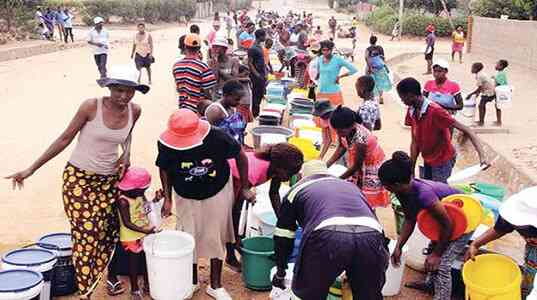
Culturally and historically, in Zimbabwe and many other countries, women and girls have been the primary caregivers responsible for household duties such as cooking, cleaning, washing, and child care. While the daily realities for women in urban and rural areas may differ, their struggles are strikingly similar in many ways.
In rural areas, young women and girls continue to walk long distances to fetch water for household use, often coupled with the additional burden of collecting firewood for cooking and heating.
These physically demanding and time-consuming chores leave little room for other activities, such as education or rest.
In urban areas, where water rationing has become common, young women and girls face similar challenges.
They often have to wake up early or venture out late at night to fetch water from communal taps or boreholes.
The scarcity of water in cities, combined with frequent power cuts, places the burden on women to find alternative ways to prepare meals for their families, often under difficult circumstances.
While some may view power cuts and water rationing as mere inconveniences, these issues have deeper implications, particularly for women and girls.
The constant struggle to secure basic resources like water and energy directly impacts their safety and well-being, turning these crises into gender-based violence (GBV) issues.
- Mavhunga puts DeMbare into Chibuku quarterfinals
- Bulls to charge into Zimbabwe gold stocks
- Ndiraya concerned as goals dry up
- Letters: How solar power is transforming African farms
Keep Reading
The ongoing electricity and water crises in Zimbabwe have heightened the challenges that women face, making them more vulnerable to abuse.
In rural areas, the long distances women and girls must travel to fetch water and firewood often expose them to the risk of harassment and assault in isolated locations.
Similarly, in urban areas, power cuts and water shortages can lead to conflicts within households, increasing the likelihood of domestic violence.
The financial strain of these shortages further escalates tensions, raising the risk of abuse.
This situation is not unique to Zimbabwe. In Gaza, for example, (before the war) the electricity and fuel crisis had similarly intensified the challenges faced by women.
According to The Humanitarian Impact of Gaza’s Electricity and Fuel Crisis on Gender-based Violence and Services, in 2017, 61% of women believe that the blockade and electricity cuts have led to a rise in domestic violence.
The limited availability of electricity—sometimes just four hours a day—forced women to cram essential household tasks into those few hours, often at night.
This uncertainty and pressure only intensify their vulnerability to tension, depression, and violence.
Zimbabwean women face similar struggles. Power outages disrupt their daily routines, making it difficult to perform essential household tasks.
This disruption contributes to increased domestic tension, as women are often left to manage these crises on their own.
Like in Gaza, Zimbabwean women become the “shock absorbers” of these crises, bearing the brunt of the physical and psychological impacts.
Water and electricity shortages also have significant economic and educational implications, particularly for women and girls.
The time and effort they spend securing basic resources greatly reduce their opportunities for education and economic participation.
In rural areas, if young girls are pulled out of school to help with household chores, it perpetuates a cycle of poverty and dependence.
Without access to education, these girls are limited in their future opportunities, trapping them in roles that offer little financial independence.
In urban areas, women face similar challenges. Power cuts and water shortages make it difficult for them to engage in income-generating activities, deepening their economic dependence on male partners.
This lack of financial independence not only limits their ability to make choices but also increases their vulnerability to gender-based violence.
Hygiene is another critical issue exacerbated by these shortages. Underprivileged girls, particularly those in rural areas, already struggle to access sanitary products due to high costs and limited availability.
While some institutions have introduced reusable pads and menstrual cups as alternatives, these substitutes require water for washing and maintaining hygiene.
The ongoing water crisis creates an additional challenge, as the shortage of water makes it difficult for girls to manage their menstrual health, leading to further disruptions in their education and well-being.
The psychological toll of water and electricity shortages on women and girls in Zimbabwe is profound.
The constant struggle to manage household needs under challenging conditions can severely affect their mental health.
Women, often seen as the primary caregivers, are burdened with the responsibility of ensuring their families’ basic needs are met despite the lack of resources.
This pressure can lead to chronic stress, anxiety, and a sense of overwhelming fatigue.
The daily battle to secure water, prepare meals without electricity, and maintain a functioning household can leave women feeling trapped in an endless cycle of exhaustion.
The uncertainty of when electricity will return or how long the bucket of water will last from creates a constant state of anxiety.
For many women, the inability to provide for their families as they would like can lead to feelings of guilt and inadequacy.
Over time, this emotional strain can manifest as depression, where women feel hopeless and powerless to change their situation.
This mental strain is often intensified by the isolation that comes with these challenges. Women may withdraw from social interactions or community activities because they are overwhelmed by their household responsibilities.
In rural and urban areas alike, the long hours spent fetching water and firewood can further isolate women from their communities, reducing their access to social support networks.
This isolation can exacerbate feelings of loneliness and despair, making it even harder for women to cope with their situation.
Consider the story of Maidei, a mother of three living in a high-density suburb in Harare.
Every morning, she wakes up at 4am to join the long queues at the community borehole, hoping to fetch enough water for her family before heading to her informal market stall.
The constant power cuts mean she has to cook over a fire, which takes more time and effort, leaving her exhausted by the end of the day.
The financial strain of buying alternative sources of energy and water adds to her stress, and tensions at home are rising. Her husband, frustrated by the situation, often takes out his anger on her.
The combination of physical exhaustion, financial pressure, and emotional abuse has left Maidei feeling depressed and hopeless.
She struggles to find joy in her daily life and often feels overwhelmed by the never-ending demands placed on her.
For women like Maidei, the mental health impacts of resource shortages can have long-term consequences.
Chronic stress can lead to physical health problems, such as high blood pressure and weakened immune systems, further complicating their ability to care for their families.
Untreated mental health issues can also lead to more severe conditions, such as major depressive disorder or anxiety disorders, making it even harder for women to function in their daily lives.
- *Madamombe is a gender and communications specialist
- These weekly articles are coordinated by Lovemore Kadenge, an independent consultant, managing consultant of Zawale Consultants (Private) Limited, past president of the Zimbabwe Economics Society and past president of the Chartered Governance & Accountancy Institute in Zimbabwe. Email — kadenge.zes@gmail.com or Mobile No. +263 772 382 852









